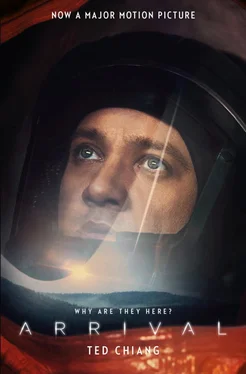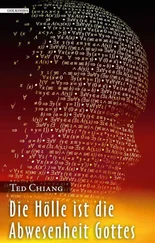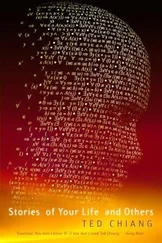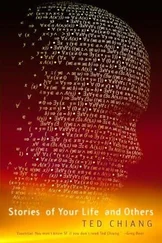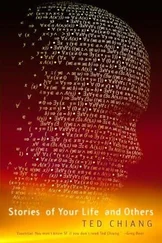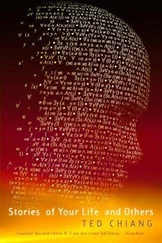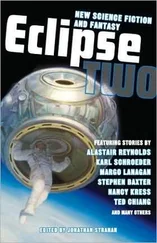Was it actually possible to know the future? Not simply to guess at it; was it possible to know what was going to happen, with absolute certainty and in specific detail? Gary once told me that the fundamental laws of physics were time-symmetric, that there was no physical difference between past and future. Given that, some might say, ‘yes, theoretically.’ But speaking more concretely, most would answer ‘no,’ because of free will.
I liked to imagine the objection as a Borgesian fabulation: consider a person standing before the Book of Ages , the chronicle that records every event, past and future. Even though the text has been photoreduced from the full-sized edition, the volume is enormous. With magnifier in hand, she flips through the tissue-thin leaves until she locates the story of her life. She finds the passage that describes her flipping through the Book of Ages , and she skips to the next column, where it details what she’ll be doing later in the day: acting on information she’s read in the Book , she’ll bet $100 on the racehorse Devil May Care and win twenty times that much.
The thought of doing just that had crossed her mind, but being a contrary sort, she now resolves to refrain from betting on the ponies altogether.
There’s the rub. The Book of Ages cannot be wrong; this scenario is based on the premise that a person is given knowledge of the actual future, not of some possible future. If this were Greek myth, circumstances would conspire to make her enact her fate despite her best efforts, but prophecies in myth are notoriously vague; the Book of Ages is quite specific, and there’s no way she can be forced to bet on a racehorse in the manner specified. The result is a contradiction: the Book of Ages must be right, by definition; yet no matter what the Book says she’ll do, she can choose to do otherwise. How can these two facts be reconciled?
They can’t be, was the common answer. A volume like the Book of Ages is a logical impossibility, for the precise reason that its existence would result in the above contradiction. Or, to be generous, some might say that the Book of Ages could exist, as long as it wasn’t accessible to readers: that volume is housed in a special collection, and no one has viewing privileges.
The existence of free will meant that we couldn’t know the future. And we knew free will existed because we had direct experience of it. Volition was an intrinsic part of consciousness.
Or was it? What if the experience of knowing the future changed a person? What if it evoked a sense of urgency, a sense of obligation to act precisely as she knew she would?
I stopped by Gary’s office before leaving for the day. ‘I’m calling it quits. Did you want to grab something to eat?’
‘Sure, just wait a second,’ he said. He shut down his computer and gathered some papers together. Then he looked up at me. ‘Hey, want to come to my place for dinner tonight? I’ll cook.’
I looked at him dubiously. ‘You can cook?’
‘Just one dish,’ he admitted. ‘But it’s a good one.’
‘Sure,’ I said. ‘I’m game.’
‘Great. We just need to go shopping for the ingredients.’
‘Don’t go to any trouble—’
‘There’s a market on the way to my house. It won’t take a minute.’
We took separate cars, me following him. I almost lost him when he abruptly turned into a parking lot. It was a gourmet market, not large, but fancy; tall glass jars stuffed with imported foods sat next to specialty utensils on the store’s stainless-steel shelves.
I accompanied Gary as he collected fresh basil, tomatoes, garlic, linguini. ‘There’s a fish market next door; we can get fresh clams there,’ he said.
‘Sounds good.’ We walked past the section of kitchen utensils. My gaze wandered over the shelves – pepper mills, garlic presses, salad tongs – and stopped on a wooden salad bowl.
When you are three, you’ll pull a dishtowel off the kitchen counter and bring that salad bowl down on top of you. I’ll make a grab for it, but I’ll miss. The edge of the bowl will leave you with a cut, on the upper edge of your forehead, that will require a single stitch. Your father and I will hold you, sobbing and stained with Caesar dressing, as we wait in the emergency room for hours.
I reached out and took the bowl from the shelf. The motion didn’t feel like something I was forced to do. Instead it seemed just as urgent as my rushing to catch the bowl when it falls on you: an instinct that I felt right in following.
‘I could use a salad bowl like this.’
Gary looked at the bowl and nodded approvingly. ‘See, wasn’t it a good thing that I had to stop at the market?’
‘Yes it was.’ We got in line to pay for our purchases.
Consider the sentence ‘The rabbit is ready to eat.’ Interpret ‘rabbit’ to be the object of ‘eat,’ and the sentence was an announcement that dinner would be served shortly. Interpret ‘rabbit’ to be the subject of ‘eat,’ and it was a hint, such as a young girl might give her mother so she’ll open a bag of Purina Bunny Chow. Two very different utterances; in fact, they were probably mutually exclusive within a single household. Yet either was a valid interpretation; only context could determine what the sentence meant.
Consider the phenomenon of light hitting water at one angle, and traveling through it at a different angle. Explain it by saying that a difference in the index of refraction caused the light to change direction, and one saw the world as humans saw it. Explain it by saying that light minimized the time needed to travel to its destination, and one saw the world as the heptapods saw it. Two very different interpretations.
The physical universe was a language with a perfectly ambiguous grammar. Every physical event was an utterance that could be parsed in two entirely different ways, one causal and the other teleological, both valid, neither one disqualifiable no matter how much context was available.
When the ancestors of humans and heptapods first acquired the spark of consciousness, they both perceived the same physical world, but they parsed their perceptions differently; the worldviews that ultimately arose were the end result of that divergence. Humans had developed a sequential mode of awareness, while heptapods had developed a simultaneous mode of awareness. We experienced events in an order, and perceived their relationship as cause and effect. They experienced all events at once, and perceived a purpose underlying them all. A minimizing, maximizing purpose.
I have a recurring dream about your death. In the dream, I’m the one who’s rock climbing – me, can you imagine it? – and you’re three years old, riding in some kind of backpack I’m wearing. We’re just a few feet below a ledge where we can rest, and you won’t wait until I’ve climbed up to it. You start pulling yourself out of the pack; I order you to stop, but of course you ignore me. I feel your weight alternating from one side of the pack to the other as you climb out; then I feel your left foot on my shoulder, and then your right. I’m screaming at you, but I can’t get a hand free to grab you. I can see the wavy design on the soles of your sneakers as you climb, and then I see a flake of stone give way beneath one of them. You slide right past me, and I can’t move a muscle. I look down and see you shrink into the distance below me.
Then, all of a sudden, I’m at the morgue. An orderly lifts the sheet from your face, and I see that you’re twenty-five.
Читать дальше
